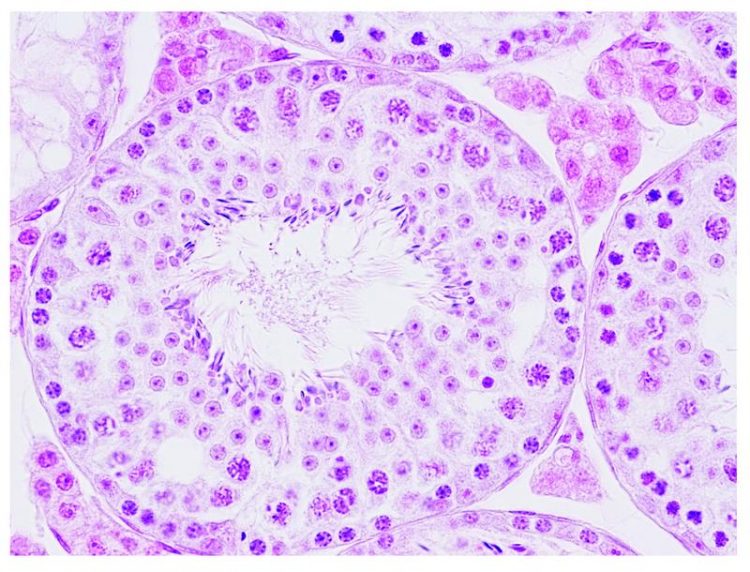More functional DNA in mitochondria cures male infertility

Microscopy image of mouse testis Max Planck Institute for Biology of Ageing
Worldwide approximately nine percent of women and men are involuntarily childless. In 40 to 50 percent of the cases this is due to male infertility.
This infertility can be caused by different reasons, one of them are mutations in the mitochondrial DNA.
Mitochondria are tiny energy factories inside the cell and harbor their own independent genome – the mitochondrial DNA (mtDNA).
Mice suffering from a high number of mutations in the mtDNA are infertile and have fewer and less motile sperm.
Max Planck scientist Min Jiang and her colleagues studied these mice and found a way to overcome the consequences of these mutations.
”We increased the total amount of mtDNA in the mitochondria of the testis. This did not change the proportion of mtDNA with mutations, but it increased the absolute number of non-mutated mtDNA, which restored mitochondrial energy production and semen quality”, explains Jiang.
As a next step the researchers want to screen for pharmaceuticals, which could stimulate total mtDNA amount in the testis.
“We hope to find an efficient future strategy to treat or even cure patients suffering from infertility caused by mtDNA mutations”, says Jiang.
Media Contact
All latest news from the category: Life Sciences and Chemistry
Articles and reports from the Life Sciences and chemistry area deal with applied and basic research into modern biology, chemistry and human medicine.
Valuable information can be found on a range of life sciences fields including bacteriology, biochemistry, bionics, bioinformatics, biophysics, biotechnology, genetics, geobotany, human biology, marine biology, microbiology, molecular biology, cellular biology, zoology, bioinorganic chemistry, microchemistry and environmental chemistry.
Newest articles

Microscopic basis of a new form of quantum magnetism
Not all magnets are the same. When we think of magnetism, we often think of magnets that stick to a refrigerator’s door. For these types of magnets, the electronic interactions…

An epigenome editing toolkit to dissect the mechanisms of gene regulation
A study from the Hackett group at EMBL Rome led to the development of a powerful epigenetic editing technology, which unlocks the ability to precisely program chromatin modifications. Understanding how…

NASA selects UF mission to better track the Earth’s water and ice
NASA has selected a team of University of Florida aerospace engineers to pursue a groundbreaking $12 million mission aimed at improving the way we track changes in Earth’s structures, such…





















